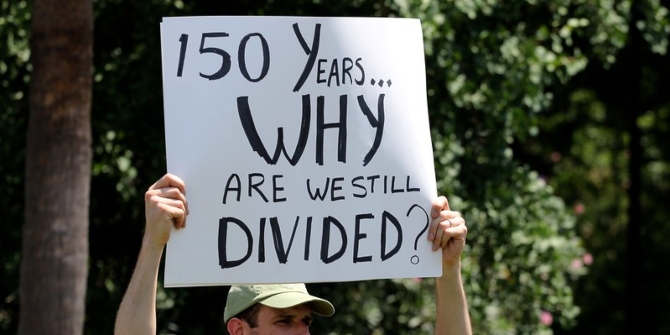 In July the former Chief of Staff to Vice President Mike Pence, Marc Short, warned that if the January 6 Committee compelled the former Vice President to testify it would set a “risky precedent”. Harry Baumgarten reminds us that throughout US history current and former members of the executive branch have testified before Congress and argues that such a request of Pence should not lead to threats of a future Republican investigation towards President Biden in reprisal.
In July the former Chief of Staff to Vice President Mike Pence, Marc Short, warned that if the January 6 Committee compelled the former Vice President to testify it would set a “risky precedent”. Harry Baumgarten reminds us that throughout US history current and former members of the executive branch have testified before Congress and argues that such a request of Pence should not lead to threats of a future Republican investigation towards President Biden in reprisal.
In July, Marc Short, former Chief of Staff to Vice President Mike Pence, warned the January 6 Committee to consider the ramifications of calling a former vice president to testify before Congress. The question posed to him by CBS’ Catherine Herridge related to whether Pence was actively considering being interviewed by the Committee. Short’s answer cautioned that Congressional subpoena power could be used to compel President Biden to testify before a Republican-controlled Congress next year if the January 6 Committee were to establish the “risky precedent” of compelling former vice presidents to testify.
Beyond Short’s lack of concern for addressing the harm wrought to our democracy during last year’s coup attempt, his leap to discussing subpoenas overlooks the fact that Pence need not be compelled to speak to the January 6 Committee. Such investigative committees often do rely on subpoenas where voluntary testimony, or else the mere threat of a subpoena, fails. Yet, in Pence’s case, the Committee has stated a clear preference for his voluntary testimony. Although Short himself testified only after a subpoena had been issued, this need not be the case for Pence, who already publicly rebuffed President Trump’s pressure during the events in question and is in a position to elevate himself above partisan rancor, if he so chooses.
Vice-presidents and elected executive officials have testified to Congress in the past
Short’s warning also misses the mark on precedent. As numerous sources make clear, there is centuries’ worth of precedent concerning current and former executive branch elected officials testifying before Congress. President Washington testified before the entire Senate in 1789 concerning Indian treaties. President Lincoln and President Wilson likewise testified before Congress during their presidencies. Vice President Schuyler Colfax testified while in office as part of a corruption investigation that concerned actions of his prior to assuming the role of vice president. Notably, President Ford testified before a House Judiciary Subcommittee concerning his decision to pardon President Nixon. Other high-level executive branch officials have done the same.
If sitting executive branch elected officials can be asked to testify before Congress, then how can this not apply to former ones? Precedent exists for this too. President Theodore Roosevelt, and others, testified before Congress after their presidencies ended. Roosevelt in fact testified twice, voluntarily, on unrelated matters, even when difficult. He, of course, was also a former vice president.
Where precedent exists for requesting voluntary testimony from such officials, why should there be a special rule barring compulsory congressional testimony of these same officials? So long as the legislative purpose requirement is met and executive privilege is not violated, subpoenaing a former executive branch elected official to testify may at times even be necessary. Such is certainly the case here, where Vice President Pence has unique knowledge of the circumstances surrounding the unprecedented attack on our nation’s democratic process by virtue of having been at the center of it, as the Framers intended.
This is before even accounting for the rich precedent of judicial subpoenas being issued to Presidents Jefferson, Monroe, Quincy Adams, Tyler, and others.
In his CBS interview, Short mentioned the possibility of investigating President Biden and his family following the November election if the current January 6 Committee were to subpoena Vice President Pence. This is concerning for three reasons. First, it conditions a future investigation of suspected corrupt dealings on the present investigation of a known attempt to subvert our democratic process writ large. The two are not linked nor are they comparable. Second, there is a qualitative difference between Pence merely being asked to provide evidence and Biden, along with his family, being the target of a potential future investigation. Third, Short’s partisan attitude is clear from the way in which he refers to Biden as a former vice president, rather than the current Commander in Chief.
Being invited to provide voluntary testimony by a Congressional committee is not the same as being compelled by a subpoena. There is ample precedent for current and former elected executive officials to testify before such committees. As even some members of the Republican Party understand, the January 6 Committee was established to examine the truly unprecedented attack on our democratic process that occurred 18 months ago. An invitation to appear before it should be met with cooperation, rather than threats of reprisal after the next election.
- Featured image: National Archives image of President Gerald R. Ford Appearing before the House Subcommittee on Criminal Justice to Give Testimony Regarding the Pardon of Richard Nixon. Courtesy Gerald R. Ford Presidential Library
- A version of this article previously appeared in The Hill.
Please read our comments policy before commenting.
Note: This article gives the views of the author, and not the position of USAPP – American Politics and Policy, nor the London School of Economics.
Shortened URL for this post: https://bit.ly/3cT17RF
About the author
 Harry William Baumgarten
Harry William Baumgarten
Harry William Baumgarten served as legislative director and counsel to members of the House of Representatives. He is also a member of the Supreme Court Bar whose writings have been featured in leading domestic and international publications.






